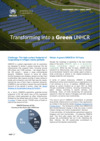UNHCR concerned over ending of rescue operation in the Mediterranean
This is a summary of what was said by UNHCR spokesperson William Spindler – to whom quoted text may be attributed – at today's press briefing at the Palais des Nations in Geneva.
UNHCR is concerned over the announcement of the ending this month of the Italian operation Mare Nostrum without a similar European search and rescue operation to replace it. This will undoubtedly increase the risk for those trying to find safety in Europe, and could lead to more refugees and migrants perishing at sea. It is estimated that 3343 people have lost their lives this year while making such journeys, 2755 of them since the start of July.
UNHCR has welcomed Mare Nostrum, which has contributed to the rescue of around 150,000 refuges and migrants since it began a year ago as a response to two tragedies off the coast of Lampedusa, where over 600 refugees and migrants died. Today, UNHCR reiterates its call for Europe to commit more resources to rescue at sea in the Mediterranean.
It is critical that the long-established tradition of rescue at sea is upheld by all. UNHCR also recognizes the efforts made by many commercial vessels - this year alone they have contributed to the rescue of about 37,000 people. To the extent possible, such rescue must ensure minimal financial impact on the shipping industry. Predictability on places for the disembarkation in safety of those rescued is also required.
In addition, Europe needs to step up efforts to provide credible legal alternatives to dangerous voyages to protect people from the risks of traveling with smugglers. The collective response needs to maintain a strong capacity to rescue people at sea and increase safer ways for refugees to find safety in Europe, including enhanced resettlement, other forms of humanitarian admission and private sponsorship schemes. UNHCR is also calling on European governments to do more to facilitate family reunification and use programmes such as student or employment visas to benefit refugees.
The level of desperation among many of those involved, fleeing war, persecution and violence, including from Syria require our concerted efforts to respond. This trend began in June and July last year, before Mare Nostrum was established, and has continued in 2014. In addition, an increased number of women, children, including many unaccompanied, and elderly people are taking to dangerous sea routes. They face greater risks, are more vulnerable to abuse and have specific needs that require assistance after they are rescued.
These challenges cannot be addressed by a few states alone; a joint European response is needed, based on collaboration among states and EU support. These efforts also need to ensure additional initial reception facilities, adequate reception conditions, assistance in processing as well as identifying solutions for those in need of international protection
For more information on this topic, please contact:
- In Rome, In Rome, Carlotta Sami on mobile +39 335 679 4746
- In Rome, Federico Fossi on mobile +31 349 0843461
- In Geneva, William Spindler on mobile +41 79 217 3011
Related news and stories
First UNITY Cup shows the power of football to connect refugees and hosts
Scholarships in Italy allow refugees to dream again
Relief for asylum seekers offered a new life outside Libya
Evacuation flights from Libya to Italy bring hope for vulnerable asylum seekers
UNHCR and Council of Europe discuss statelessness, urge States to uphold the right to a nationality in Europe
UNHCR warns of mounting refugee and migrant deaths in the Central Mediterranean
-

Transforming into a Green UNHCR
4 Apr 2022 Despite the challenge of operating in the most remote areas of the world, UNHCR's vision is to become the leading humanitarian agency in environmental sustainability. Within the next 10 years, UNHCR aims to transform its infrastructure, fleet, and travel to minimize its environmental footprint and enable green solutions, while continuing to adhere to the highest standards of refugee protection and response. -

Virtual Informal Briefing on the Global Compact on Refugees Summary
1 Apr 2022 The first quarterly informal briefing on the Global Compact on Refugees (GCR) for 2022 was convened on 30 March to provide a summary of key takeaways and recommendations from stocktaking and the High-Level Officials Meeting (HLOM) in 2021 and the roadmap for the next Global Refugee Forum in 2023. -

Informal Briefing on the Global Compact on Refugees - PowerPoint Presentation
1 Apr 2022 -

2023 Global Refugee Forum - Proposed Roadmap
1 Apr 2022 -

Cash offers a lifeline to refugees from Ukraine arriving in Poland
1 Apr 2022 Cash assistance is allowing refugees from Ukraine to make their own decisions about what they need most after arriving in Poland and other countries in the region. -

Thousands flee into Uganda following clashes in DR Congo
1 Apr 2022 -

On Oscars night, Hollywood stars show solidarity #WithRefugees
1 Apr 2022 With themes of displacement and loss featuring in many of the nominated films, celebrities at the ceremony and online shone a light on refugee crises in Ukraine and beyond. -

Europe Region Monthly Update April 2022
Apr 2022 -

30 March 2022 - Video - Virtual quarterly informal briefing on the Global Compact on Refugees
31 Mar 2022
